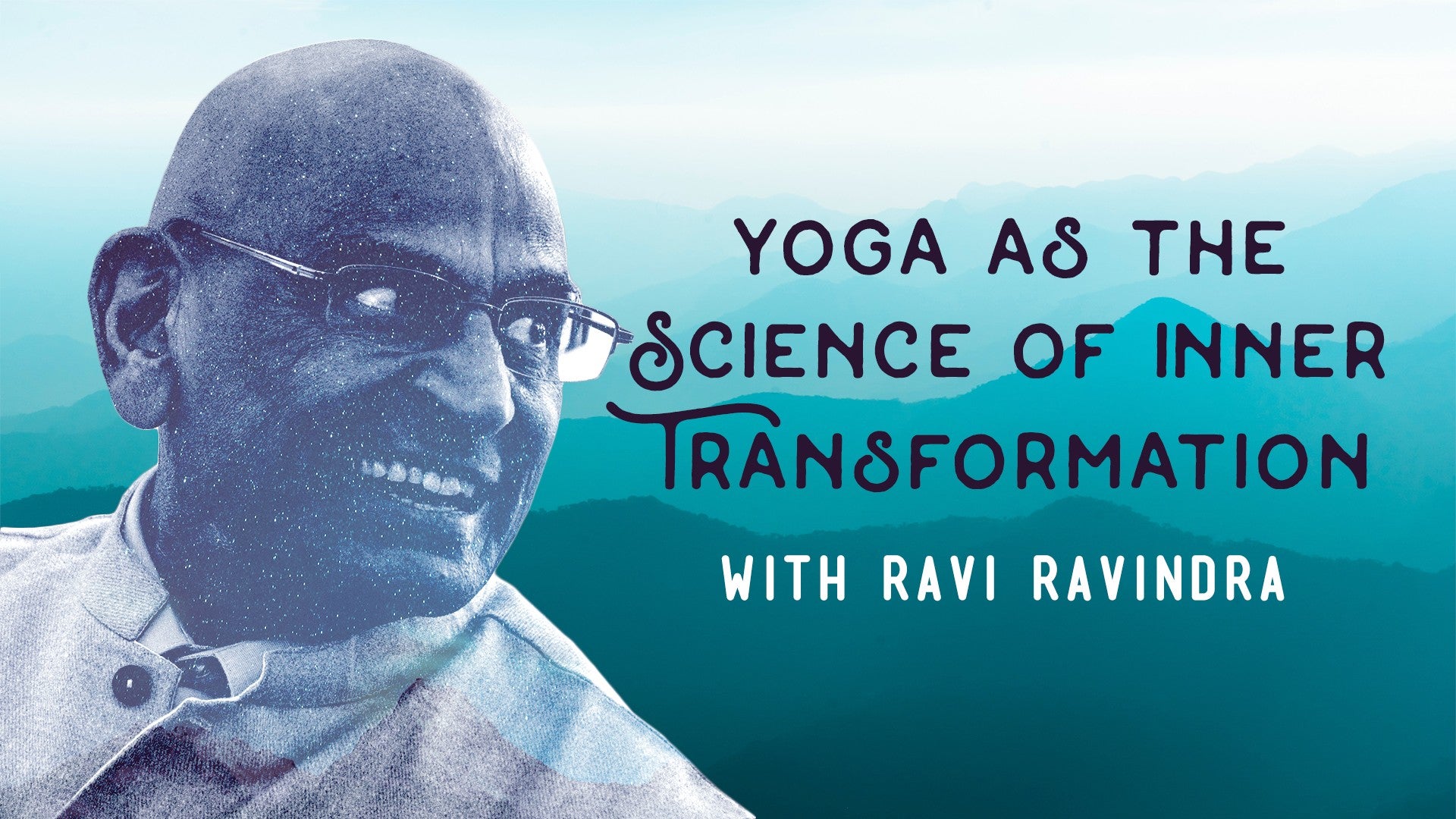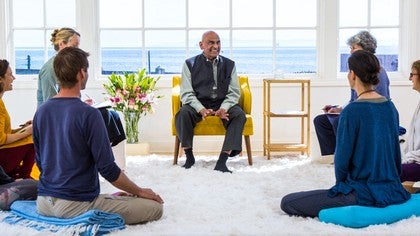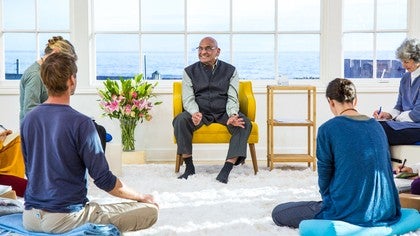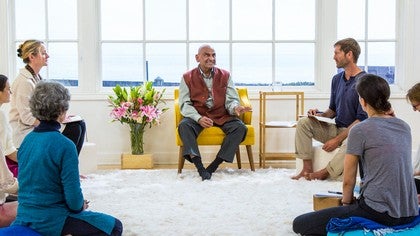Description
About This Video
Transcript
Read Full Transcript
Chapter 1
Meditation
As we begin our meditation, let me make a couple of remarks. Generally, people are asked to close their eyes, but it is not necessary. For some people, closing their eyes makes them feel a little uneasy. On the other hand, if your eyes are open, there tends to be much more distraction. So you decide what is suitable for you, or in between, if you need to open your eyes for a few moments, that's perfectly fine. Also, there gets to be a lot of dogmatic suggestions about how your hands need to be. So much of this depends on the length of your torso and the length of your arms.
So wherever you are comfortable, as long as it does not create tension, especially in the shoulders. So your hands can be like this, or like this. If you are generally right handed, and if your hands are together, it is good to have your left hand just resting on your right hand, and vice versa. But none of this is compulsory. You find what is suitable. It is good for us to place our own existence in the vastness of the universe. Just a simple reminder that our astrophysicists now say we have two trillion galaxies, and we are in a very average galaxy. This is only the quantitative aspect of cosmology. Qualitatively, all the sages in the history of humanity and all the great scientists and philosophers have said in different words that there is a cosmic intelligence.
This is actually an expression of Einstein, or that there is the Absolute or Holy Spirit or God or Brahma, many different labels. But what is common to all of these? That these energies are subtle and very conscious. And furthermore, that the entire manifested universe, all of these two trillion galaxies, according to all of these sages, are not emerging from dead matter, but from the highest level of consciousness. As I said, labeled God or Brahma. Furthermore, that this highest level of consciousness, this energy, permeates the whole space. Naturally, this room is hardly excluded. So whatever label appeals to you, I can just tentatively use one expression.
So the Holy Spirit is right here, right in this very room. And the purpose of any spiritual practice, including meditation, each practice has a specificity, special possibilities. The purpose of any of them is, how can I become more and more an instrument of this divine energy? Whatever label speaks to me, because this energy is more conscious than I am, I cannot command it. What is required from my side is an attitude of invocation and invitation or a prayer, so that I can become more and more receptive to these subtle energies.
And the fundamental contribution from our side to become receptive is relaxation, deeper and deeper relaxation. Even in ordinary science, we would say, subtler the energy, more quickly it is repelled by tensions. So to find our relaxation, but not only physical relaxation, even more importantly, emotional relaxation. If I am occupied with some anxiety or fear, jealousy, even excitement and expectation, all these create emotional tensions. So I watch, and in order to be a little bit freer of usual state of anxiety and worry, I can begin to take interest in something which is a great mystery, that in this vast universe, filled with conscious energies, that I should be created for a few decades.
If I can be a little free to wonder about this, not to be arguing this way, that way or quoting some scripture, but a sense of wonder, this is a great miracle that for a few decades I should be here. Then gradually one moves towards a sense of wonder, and wonder and anxiety do not coexist. So to move towards more and more relaxation, I need to move towards a sense of wonder. The other contribution from our side is to find the right alignment. Just a reminder, as far as we know, only human beings have the possibility of having a vertical posture and if their eyes are open they can look horizontally. No other creature has this possibility.
And if there really are conscious energies which have created the universe, this is a special call to human beings. So I search for that alignment, a vertical posture without rigidity, and my head is not turned left or right or up or down, I should be able to look horizontally if my eyes are open. But posture is not only a physical posture, we also have intellectual postures. And there all that I need is to remind myself that even if I was a combination of Einstein, Aristotle, Nagarjuna and Shankara, I cannot know all there is to know. Therefore, to be open to be surprised, I do not know and cannot know all there is to know. Therefore, not making a commentary on everything I hear or pigeonholing it in some scripture or some teacher.
So now I take a few moments again and again finding deeper and deeper relaxation and wondering and searching for the right posture intellectually, emotionally, physically. So that I become more and more receptive to the Holy Spirit or Brahma or Allah, whatever label appeals to me. Again and again, even internally, I can be repeating this as a mystery. Why in this vast universe I should be created for a few decades? What is required of me from the perspective of the divine energy? Something we can always return to before meditation, beginning even, that I did not create myself and that my life on this planet at this time cannot be simply a personal project.
I take three breaths, wondering why am I here? Then we'll stop. Thank you. Well, this whole course is really titled Yoga as the Science of Inner Transformation and I would like to make a few general remarks before getting into many more details.
Chapter 2
Talk
One is that since yoga is associated very much with the Indian tradition and it is therefore good for us to begin from the very source of the Indian tradition. So I will start with a remark from the Rig Veda, which is regarded in India in any case as the very basis of the tradition.
And of course, Indian style of speaking about it is that it originated right at the beginning of the universe. Western academics don't like that kind of language. So for them, they have to figure out when it was actually written. So in general, everybody would agree that this is the oldest text in any Indo-European language and the dates of it keeps getting further back, every 500 years back after every couple of decades, because they just can't figure it out how old it is. But in any case, the oldest text. So there, there is a remark of Indra, who is actually chief of the gods. And maybe I mentioned this even in Sanskrit.
I do not know what I am, whether I am the same as this cosmos or different, yet conceited in my mind, I wonder. That is just about as much a description of all of us as any. This is the chief of the gods, Indra, saying in the oldest text in any Indo-European language. There are two words in here. I'm not assuming that you folks know Sanskrit. So I will emphasize two words, aham and idam. Aham literally means I or myself.
Aham is referring to the universe. So the question partly is being raised, whether myself and the rest of the universe, are they arising from the same source or are they two different entities? And, and the classical response to this in the Rig Veda by all the rishis, the word rishi literally means the seer, those who see directly. So there are many rishis in the Rig Veda. And the general response is that everything arises from that one, tad ekam. So there is one fundamental source of everything, traditionally gets labeled Brahma. Literally the word Brahma means the vastness. It's even a standard Sanskrit word in which it really refers to something very vast.
But of course in English these days, the word vastness usually seems to convey largeness in space, but not in time. Therefore sometimes it is also translated as the eternal, because it is also intended to be both in time and beyond time, in space and beyond space. And in fact the classical way of speaking about Brahma, even though the sages say something about it, but nothing can really be said. Neti neti is a classical expression, not this, not this, or not yet, not yet. And that is, whatever description we give, description itself limits reality.
And therefore the suggestion is, of course human beings naturally need some direction. But there, let me remind you of a very large idea actually conveyed by a metaphor from very old times in India. There are many lamp posts, and if we are walking towards them, they throw light on our path. But the moment we go past them, they begin to throw our own shadow on the path. So be careful about all lamp posts, all the scriptures, all the teachings of any of the sages, but they can be great help.
So don't be against them. That's not the point that is being made. But every expression has a limitation to it, which is why really all the sages ultimately end up saying that it can't be described. For example, the Buddha refused to describe what nirvana is, or Christ refuses to describe what is the kingdom of heaven. But when they are pressed by their followers, they sometimes say something. So Christ said, well, it's like a mustard seed.
Now, do you think that clarifies things to you? That's the description of Christ about the kingdom of heaven. So I'm just simply reminding you that the sages are also being forced or pressured by their disciples often to say something about it. Sometimes they say something seemingly negative. For example, the Buddha did say nirvana is free of suffering, not describing what it is, but what it is not.
So there are certain ways, but all of these descriptions or pointers can be helpful, but all the sages have always said don't get attached to any of these descriptions. Then the suggestion is that the reason I'm going back to the Rig Veda, because beginnings of the whole of the yoga traditions begin from there. In a way, they don't necessarily use the word yoga in the sense of physical practices. Just to remind you, two of the classical texts of yoga, the Bhagavad Gita and the Yoga Sutra, neither one of them actually mentions any particular asana as an example. Then very much the suggestion that one needs to be very much concerned with that there are three or four words used in Sanskrit.
Maybe I'll just mention them. Satyam, Ritam, Brahat, Truth, Order and Vastness. Sometimes the word vastness gets replaced by Jyotir meaning light or Amritam meaning eternal life. And very much this suggestion that this is something which is not obvious to everybody, that it requires search. One of the common lessons of all the scriptures that at least I have encountered are the teachings of all the sages. In fact, I often invite my friends, if you know any exception, please point it out.
I will happily give you a ticket to fly to Halifax for a visit. But the one common lesson of all the sages is, as long as I remain the way I am, I cannot come to the truth or to God or to real, whatever label you wish to attach to it. Let me repeat this. Each one of these teachings insists that a radical transformation is required of our whole being, including the mind, including the emotions, including even the body. This may surprise people, but this is the reason I want to emphasize this.
A radical transformation is required. Let me just take a few moments to give you some sort of specific examples of this. Some of you would know, partly because most of you, you may not be especially involved in the church going, etc. But one grows up in a culture, gradually one just learns, even as a kid, many things from the scriptures, etc. So some of you would know, Nicodemus, who is a member of the Jewish Sanhedrin, goes to, he is convinced that Christ is exceptional.
By the way, it was the Sanhedrin, means the council. It was the council which ultimately actually condemned Christ to be crucified, but only by majority vote. Nicodemus was a member of that council, but he has to sneak out to see Christ, because he doesn't want to be seen, he is doing this. I sometimes give this example, it's like a cardinal in the Vatican going to visit the Dalai Lama for spiritual council. He has to sneak out, otherwise it's not quite part of the tradition, you see.
So in any case, he comes in the middle of the night, and his very first question is, how can one enter the kingdom of heaven? By the way, if you're interested, this is the third chapter in John's Gospel, I happily invite you to read this. The whole chapter is dealing with this. And what is the response of Christ? In order to enter the kingdom of heaven, you must be born again, born from above, born of the spirit.
This is the fundamental requirement, each one of us is naturally born of the flesh. But the suggestion is, can we be also born of the spirit? And that is the fundamental requirement, which requires a radical transformation. Even Nicodemus, by the way, literally the word, it's a Greek expression, simply means the ruler of men, Nicodemus. And he's obviously in the council, so highly regarded man, but even he takes it literally.
How can a man like me reenter the womb of his mother? This is what he says, and be born again. So you see the difficulty, when the great sages, in this case Christ, is saying something subtle, something spiritual, even an intelligent man understands this literally, as if he has to reenter the womb of his mother to be born again. So fundamental transformation is required, but it always gets complicated or misunderstood in one way or the other. So we need to stay with that. Why is yoga? What is it trying to suggest?
Let me first of all make a kind of a summary statement. The transformation that is really required is freedom from myself. Generally we are looking for freedom for myself. We need to be very clear about this, and maybe it will be again helpful here. Let me quote to you, this is again from the Gospel of Matthew in this case, this is a remark of Christ.
Unless you leave yourself behind, you cannot be a follower of mine. This very idea is expressed in all the canonical Gospels, slightly different language. In some cases actually very stridently, unless you die to yourself, you cannot be a follower of mine. Sometimes it is expressed much more strongly. I am quoting the simplest version of this here, this is from the Gospel of Matthew.
But you would find exactly similar things, naturally the language varies a little bit. In every scripture, in the teaching of any sage, you can take contemporary sages. For example, some of you may be interested in what Krishnamurti brought, or what Raman Maharshi, or Lidalaylama, or any of the sages that appeal to you. You would see everywhere a requirement of being radically transformed. And that is actually the whole purpose of any serious spiritual teaching, including yoga, which is what we are now here trying to speak about.
What is it that stands in our way? Why this transformation is so difficult? Partly because this is the kind of thing, I will have little later on, maybe later this afternoon or tomorrow, this is what Patanjali in the yoga sutra is called clasious, which means hindrance or resistance, what stands in our way. And unless we can also begin to see that all of these teachings actually apply to me also, then one can have an academic dispute about this, this word doesn't agree with that, etc. That is, of course, that's what keeps all the scholars' jobs going.
So we don't need to be against that. But otherwise, my strong suggestion to all of you is, reading any scripture, reading the remarks of any of the sages, always ask, how does it apply to me? And then, what is being demanded of me here? How do I respond to this? Otherwise, one can have every school of theology, every school of philosophy is having endless arguments about this or that.
Is God ultimately unity or trinity, etc., etc., you can forever keep arguing. Usually the people who have no direct experience of either the unity or the trinity forever argue about this. So I highly recommend this because there is very great wisdom in scriptures, in the teachings of really all the great sages. Don't be sectarian because naturally each sage is speaking in a particular language, to a particular community, at a particular time in history. So they tend to emphasize certain things which other sages at other places don't emphasize or they emphasize different things.
So one does not need to get so occupied with the surface of things. But what is being called from us? So now I am simply repeating this remark that if there is one common lesson of all the teachings and all the sages of scriptures, it is simply this. Unless I am radically transformed, sometimes using expression like born again or dying to myself, dying to my usual self, etc., I cannot come to the truth or to God or to the real, whatever other label you wish to apply. Then it naturally becomes important, how do we undertake transformation?
So we need to then ask ourselves, what stands in the way? What is this thing, freedom from myself? Now this is a very large area, partly because I invite you to consider, what do we call myself? Each one of us naturally is very deeply conditioned by our whole cultural heritage. Especially as kids, we learn certain hymns or songs or in the schools, for example.
Let me just take the example because most of you are here in a Judeo-Christian background. You have holidays at Easter and Christmas, but not when the Buddha was enlightened. That naturally influences the kids growing up in schools. They might, again, sometimes people argue and they don't do it in some schools, but they might have Nativity plays, they would know the Three Magi coming. All these expressions are not unusual for somebody growing up in a Christian background.
But if you were growing up in Saudi Arabia or in Thailand, you would have a different background. So we are very much influenced by our cultural background and all the corresponding mythology that goes with it, corresponding fairy tales and hymns, language even. This may always surprise people. English language has been very much influenced by the Bible. We actually had a very great scholar in Canada, Northrop Fry, who wrote a whole book on this, called The Great Code or The Secret Great Code.
It's the title of his book, if you're interested, in which he actually traces how much of the English language is actually very much influenced by the Bible. And now these days, of course, everywhere, everybody is obliged to speak English. And this creates very interesting issues. For example, in India, I mentioned one issue that came to the Supreme Court and it became a huge problem because the Supreme Court of India ultimately is dealing in English and they even say explicitly that final decision will be made on what is the Oxford English Dictionary defining this. So the word religion, as understood here, is separated from philosophy, which is not the case in India.
So an issue had come up. I quickly mentioned this without getting into too much detail. Aurobindo, a very highly regarded sage in India, there is a town that was formed called Auroville, which has many foreigners in it, and the Indian government actually gave that, more or less freed that from the dominion of India, as a matter of fact, so that it can be an international town. And there were some difficulties and scandals there. Then the question became, ultimately the court case was, is Aurobindo, was he teaching philosophy or was he teaching religion?
Now in India, this will be a very weird question. But in the English language, it's a real question because from the 10th century, in fact, slightly later, 11th century, Thomas Aquinas was professor of theology in the University of Paris, and at the same time they had another professor, professor of philosophy. So these two fields have been separated for at least a thousand years in the Western world, but not in India. So this has implications. So the reason I'm saying some of these things, that each one of us is very much influenced by our culture, by our language, by our religion.
And furthermore, if I come from a rich family rather than a poor family, that would influence me. If I'm a male rather than female, that would influence me. In fact, if I'm the oldest brother or the youngest brother or the middle brother, that influences me. More and more, it's quite amazing how much condition we are by so many factors. So whatever I call myself is the end product of all my entire past history, even my species' history.
And what is very interesting, the suggestion when we say to be Christ's remark or similar remarks of everybody else, all the great teachers have similar remarks in this area, namely that I need to be free of myself. Just to remind you, this is the remark of Krishnamurti, as long as I am, love is not. You see? It's a Krishnamurti's remark. But what I am is so much conditioned by all of this entire background. So the suggestion really is, can I be wholly free of my entire past conditioning?
Because the search in any spiritual teaching really is for completely objective truth. Now, here I should take a few moments to make a remark, because in a way one could say that's the domain of science, searching for objective truth. But some of you, if you are familiar with some of the philosophical background, Immanuel Kant, now more than a hundred years ago, was writing a very famous book of his called The Critique of Pure Reason, in which he actually discusses that no scientific knowledge can be completely objective because the object gives something, but our mind gives something. In fact, he discusses in great detail that there are twelve factors, twelve categories that the mind introduces, and that mind cannot think without these. Time is one, space is another, causality is another, quantity is another, there are twelve of these.
And this has never been disputed. There are some slight refinements, some changes on it. But what is the glory of science is not that it is actually producing objective knowledge, but it is inter-subjective knowledge. That if I say something, it can be verified by somebody else, it can be tested by others. But the mind is always introducing something. In the spiritual teachings, the suggestion very much is, can the mind get a little bit out of the way? You probably already know the famous remark of in the yoga sutra, the very first substantial sutra, this is the second sutra in the first chapter, Yoga chitta vrittin roda. Yoga is stopping all the movements of the mind.
Because of the very strong suggestion that the mind is not the real knower, but it can be a good instrument of knowledge or a bad instrument of knowledge. Just as a telescope or a microscope is not the knower, but we can have a good microscope or a bad microscope, and it will have some effect. But similarly, this is very much the suggestion in all spiritual teachings. Let me actually maybe take a moment here to say the very word spiritual actually means that it is referring to reality subtler than the body and the mind. And then sometimes people get a little, they can understand this part, but then they forget that within the spiritual realm also there are many levels.
So from a practical point of view, it's not a good idea to certainly jump to the highest almighty God. For example, I again give this example only from the biblical tradition. That may be slightly more familiar to you. In the Bible, we have nine orders of angels between human beings and God. They are all spiritual. It's a very large realm. In fact, hardly any of the prophets other than Moses and Christ actually encountered God. They were visited by one angel or another, including Prophet Muhammad.
This is the whole, I'm talking about the whole Abrahamic tradition here, which includes whatever we call Judaism, Christianity and Islam. Hardly any of the prophets actually encountered God. It's very cheap to just think we can jump to Mount Everest without trying to climb little hills. First of all, practicing little hills. So I invite you to realize that the whole realm of the spiritual world is very large.
Similarly in India, there are many devas and yaksas, etc. Maybe they'll be less familiar to you. So then there is another very important aspect actually coming from the Rig Veda onwards that I should also emphasize, because that becomes part of the purpose of the transformation in yoga. Very strong suggestion. Actually, let me actually give you the particular expression for this, that we all are amritasya putra. We are children of eternal life. This is the actual expression in the Rig Veda. Amritasya putra.
This is very important here for me to emphasize, because especially since it is a little bit of a contrast with some of the fundamental assumptions in the Abrahamic tradition to which willy-nilly all of you belong, whether you like it or not. So it's good for you to know what actually, whenever any serious theologians, even in the Vatican by the way, or in the Muslim world, have been very critical of yoga, and actually it's been even banned in some places, you should know the reason behind that. And this is one of the fundamental distinctions between the Indian tradition, to which in a way yoga belongs, and the Abrahamic tradition. In the Abrahamic tradition, God created the world, but no creature can possibly be at the same level as God. Just as a quick reminder, I just mentioned there are nine orders of angels. The highest angel was Lucifer, literally means the light bearer.
Why was he expelled from heaven? Now I refer to you to this prophet Isaiah in the Bible, you can read that. He actually specifically mentioned, because Lucifer wished to be like the Most High, therefore he is expelled from heaven. And anybody in the whole Abrahamic tradition who ever claimed or suggested that they are one with God was in trouble. For example, Christ, as you probably all know, this is 10th chapter of John's Gospel, where he actually says, my father and I are one. And the remark is to him, I'm quoting from the Bible, you a mere man claim to be one with God. This is blasphemy.
Similarly, anybody else in the Christian tradition, he was actually in the Jewish tradition, one should not forget this, but anybody later on in the Christian tradition or in the Islamic tradition, whoever came anywhere close to it, they were always either burnt at the stake or certainly excommunicated, that would be the least actually, but usually they were killed in one way or the other. This is a fundamental distinction from the Indian tradition, because in the Indian tradition, to which yoga belongs, and therefore you can see why theologians are slightly uneasy with this. That in the Indian tradition, Brahma, which will be the label for the highest reality, as I mentioned earlier, did not create the world. Brahma became the world. It is not a creation myth, it is closer to an emanation myth, that everything that exists has Brahma in it. So Brahma is not only in everything, Brahma is everything. Therefore there is no distinction between sacred and secular.
Even a mouse, or even whatever we might call a piece of dead matter, in principle, has Brahma in it. Krishna in the Bhagavad Gita repeatedly says, everything that exists is a combination of the field and the knower of the field. We might say body and spirit, if you like, and that I am the knower of the field in all fields. Krishna is saying this in the 13th chapter in the Bhagavad Gita. So, I mentioned some of these things, because there is a very fundamental distinction that begins from here.
Then, actually the classical analogy given in the oldest Upanishad, Brahad Aranyaka Upanishad, is, just as the spider web oozes out of the substance of the spider, then the spider can go anywhere on the spider web, or even away from the spider web. So, even though it is true that the whole world oozes out of Brahma, but Brahma is not limited to the world. It can move anywhere or even away from the world. Do you see the point I am trying to make here? This is the classical analogy. And therefore, the call to every human being is to, that substantially, potentially, I have the Brahma nature in me, but how do I realize it? Therefore, in India, self-realization is exactly the same thing as God-realization.
This would be very weird in the Abrahamic context. And so, yoga in principle is trying to lead us towards, or any teaching in India, that is what it is trying to lead towards, discovering one's identity with Brahma. So, you can see where the trouble comes. Now, on the other hand, I want to make a point here. There is nothing specially sectarian or Indian about yoga, even though one needs to understand the background of it, so therefore it is naturally colored by it. The law of gravitation was propounded by an Englishman called Isaac Newton, but if that law applies only in England, it cannot be a true law of nature.
Or if only the English can understand that law, then it can't be a true law of nature. Similarly, yoga, in my judgment, is actually a whole science of inner transformation, not meant only for the Indians. But it is true, on the other hand, so that for people to realize, for example, a great deal of modern science, starting from the 16th century onwards, developed in Europe, particularly Western Europe, so because of the linguistic basis there is from Latin or Greek, so many things get labeled either in Greek terminology or in Latin. For example, gold, symbol for gold is A-U. Why? Because it's actually coming from the Latin word.
So similar things will happen in yoga, because it comes from a whole Indian tradition, so it's natural. Many of the phrases and the words or even certain kind of symbols get arising from the Indian culture. But to imagine that it can only apply to the Indians would be really quite crazy. But I'm here, therefore, giving you an argument not to become so sectarian about this. This is not meant to be only for the Indians.
If it is true, it is true. This is actually personally, in my judgment, one of the almost the grandeur of the Indian tradition, that it doesn't matter who said something or who brought something. If it is true, it is true. Or when it was brought, even that would be irrelevant. In fact, consequence of that is that India has not much interest in history. This is one of the consequences, which is why they say the Rig Veda came along with the origin of the universe, because it's just somehow fundamental text, you know. But this kind of thing doesn't appeal to Western minds.
Anyhow, we return to the, then, the, if yoga really is a science of inner transformation, one needs to be very clear why something needs to be transformed in me. Earlier I said that this is almost a fundamental requirement in any scripture or any teaching. This is where one begins to then understand that much of our life is really lived by or driven by what's good for me. How do I gain something from this? How do I get ahead? How do I prosper? The word I can be extended to my family, or sometimes even to one's community, or maybe even to one's country.
But it always, when we speak about freedom from myself, one needs to seriously ask, what is this myself? Now, classical ways of saying that is, I'm here using more or less the language of Patanjali in the Yoga Sutras, that the word is asmita, and this is the fundamental klesha, and klesha meaning resistance or hindrance or obstacle. And asmita literally means I am this or I am that. I identify myself with something, and therefore I move away from my identity with the wholeness of being. And that the isolated self is by nature isolating self.
I am separated from the rest of the whole being, from nature, from other creatures, from my neighbours, my being, everything. And that that isolated self, asmita, is by nature isolating more and more and more. So freedom from myself is really freedom from that, fundamentally. And putting it slightly more positively, if you like, because right from Rig Veda onwards, there is question, as I quoted earlier, even the God Deva Indra saying, whether I am the same or I am not the same as the universe. So the fundamental question really becomes, what am I? Or who am I? I actually personally tend to prefer these days, what am I?
Partly because who am I already personalises it a little bit, at least in ordinary English. So, what am I and why I am here? So there is a phrase in Sanskrit, koham, literally means what am I or who am I. That is regarded as the fundamental question in the whole of the Indian tradition. And therefore, for example, when Patanjali speaks about, maybe I need to step back a little bit. This is another, not as serious a difference between the Abrahamic tradition and the Indian tradition, because they come close to each other.
But in the Indian tradition, according to all the sages that at least I have ever encountered in their writing, or sometimes one meets them personally, like Krishnamurti, the root source of all our problems or difficulties is avidya, ignorance. In fact, Patanjali describes various pleasures and then he says they all arise from avidya. If you are interested, that is the fourth sutra in the second chapter of Yoga Sutras. That avidya, which means ignorance, is the fundamental impediment. By the way, there is another word, actually in the Bhagavad Gita, avidya is not used as much as agyan.
Gyan means knowledge, it's cognate with the Greek word gnosis, and agyan is the negative of knowledge, so ignorance. So you can come across both of these words, either avidya or agyan, avidya is maybe more familiar. So in India, that is the root of all our problems, is ignorance. And fundamentally, ignorance about myself, what am I, is the fundamental source of ignorance. Later on, I'll have time to maybe develop a little bit more detail about the various cliches, then we'll speak about it in more detail, but right now.
Whereas in the Abrahamic tradition, the source of all our problems and difficulties is disobedience of the will of God. And it began in the garden of Eden, Adam refusing he ate the fruit of the tree of knowledge, which he was forbidden to do. And in a typical male manner, he blames Eve, and Eve blames the snake, actually, the serpent. So they keep blaming each other, but they are punished for this, for eating the disobedience of the will of God. And that becomes, particularly in Christianity, that's the whole fundamental reason for the doctrine of original sin.
That's the original sin, and even a baby by breath one is sinful because he or she is a child of Adam and Eve. So the sinfulness becomes the fundamental aspect of a human being, which is so contrary. There is no shortage of sin in India, I can assure you, but they still believe deep down their Brahma. I keep reminding people more than a third of the Indian parliamentarians have criminal records against them, but they carry names like Rama and Krishna, and they're convinced that they are divine. But you see the fundamental difference in the two attitudes, and therefore, Avidya, in any case, coming back to the yoga, Avidya is the source of the problem, all problems, and the major Avidya or ignorance is, who am I?
And then it results into separating myself from others, etc., etc. So the rest of them all follows from this major, in fact, that is the definition of Avidya given by Patanjali. Fifth sutra, if you are interested. Avidya is to think that the transient is eternal and that non-self is the self. So to think that I am the body, which is obviously transient, would be regarded as Avidya. So what am I or who am I becomes really the fundamental question.
Vij Prashna is the Sanskrit expression, literally means the seed question, that every other question follows from this. And I would like to remind you that this question cannot strictly speaking be solved by any kind of irrational answer, but it carries energy. If you come back to this question, it actually has an effect on one's life. How even I approach myself. Maybe here I would like to perhaps end this conversation by quoting to you a poem written by Rabindranath Tagore, perhaps the greatest poet in India in any case in the 20th century. Thirteen days before he died, he wrote a poem in Bengali, which was his mother tongue, but I'll mention this in English here. In the beginning of my life, with the first rays of the rising sun, I asked, Who am I?
Now, at the end of my life, with the last rays of the setting sun, I ask, Who am I?
Chapter 3
Homework
Okay, at the end of this particular day, let me suggest sort of a homework. Do you think that your birth is just accidental or is there some purpose to it? What do you believe is the purpose? Nobody else needs to be convinced of this. It's really your own question.
Associated with this, something that is actually implied by many great spiritual traditions, is there some level of subtle energy, you may call it a deva or an angel, who is actually interested that you should remain alive for a few decades? Or is this entirely your personal project? There is not a right or wrong answer to this. It's really an invitation to reflect on this. So then we'll see each other tomorrow. Thank you.
Yoga as the Science of Inner Transformation
Comments
You need to be a subscriber to post a comment.
Please Log In or Create an Account to start your free trial.




















